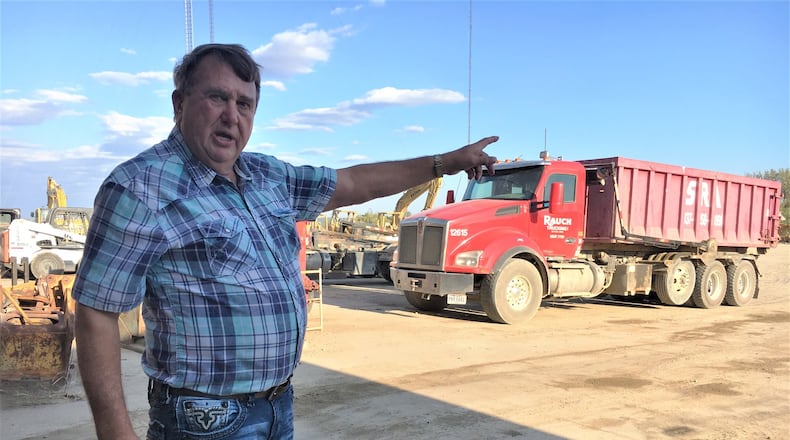He added: “The community’s biggest fear is that Mr. Rauch will attempt to expand this facility out of its 10-acre footprint into a full scale landfill. The township has updated its zoning code which should prevent this from happening.”
Attorney Terry Posey, who represents Rauch, said Friday not much construction has started on the facility, which will be located on 10 acres of the Bearcreek Farm property in Jefferson Twp.
But the Rauch team’s most recent understanding from the EPA is that a permit issued in 2019 is still valid, which means work can begin, Posey said.
“We’re excited to put this matter to bed and get to work on the composting facility,” he said.
Rauch first proposed the facility at 7750 Dayton-Farmersville Road in 2014.
“It’s going to be a huge problem, huge complaints from the residents,” McGuire said Friday. “I was elected from my participation in fighting this.”
According to court filings, the Jefferson Twp. Zoning Department in early 2018 issued a permit allowing Rauch to build a composting facility.
However, Rauch argued that the township imposed “impossible” conditions, requiring him to have a facility running within a year — but operating the facility without first obtaining an EPA permit “would violate the site conditions of the permit and Ohio law,” according to filings.
Rauch met with Zoning Administrator John Calligan in 2019, and discussed the process of “making changes to the site plan, the application to the EPA, and the implication that process would have on the one-year expiration date of the permit,” filings indicated.
Rauch “contends that Calligan expressed that he understood that it could take a long time to get the necessary permits, and that the one-year time limit would not start running until the EPA permit was issued,” according to a Montgomery County Common Pleas court recounting of the case.
“Following this conversation, Calligan began to have second thoughts, and proceeded to speak with zoning officials from other cities regarding the start date of the one-year period,” the court said.
In June 2020, the Jefferson Twp. Board of Zoning Appeals voted to uphold Calligan’s decision to revoke the permit.
According to Rauch, that was an “unlawful revocation of a state permit.”
The common pleas court affirmed the township’s decision in early 2021. But in August, the Second Appellate District Court of Appeals reversed the lower court’s decision.
That was the most recent ruling before the Supreme Court declined to hear the case.
“Once the appeals have been exhausted, that clears the way for the project to break ground and move forward,” McGuire said Friday.
Rauch has been involved in other legal cases in Montgomery County.
In October 2019, a jury in Montgomery County Court found Rauch not guilty of illegal open dumping charges at sites in West Carrollton and Jefferson Twp. He was also found not guilty of operating a solid waste facility without a license.
Another Rauch company, SRI Inc., was convicted of a felony and a misdemeanor in the 2016 dumping case involving the Dayton business, city of West Carrollton-owned land and a Miamisburg demolition site.
About the Author

